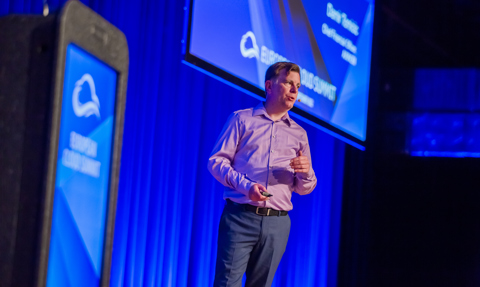It's often said that the speakers are the stars when it comes to conferences.
With every year that your conference grows, so too does the demand for higher quality, influential speakers. Therefore, conference organizers dedicate a big chunk of their time to define who to communicate with event speakers to join their events.
When and how to communicate with conference speakers has become an art form, especially as organizers must pass on information effectively that goes beyond simple announcements (i.e., call for speakers, social media announcements and email invitations).
As an event organizer, if you want to do it right and grow your event speaker database, you should start by understanding who is the right fit for each event growth stage.
Table of Contents
Finding ideal event speakers starts with the selection process
Pre-event communication with speakers
Post-event communication ensures quality future events
Finding ideal event speakers starts with the selection process
Once you have defined the major topics with your planning team, it’s time to think about your ideal event speakers. In addition to those who you already have in your network, you can start researching other conference speakers using different criteria (e.g., based on their social media network activity).
When you are satisfied with your selection of speakers, it's a good idea to provide them with event or conference guidelines. You should start with topic trends, presentation length, and general information about the Q&A session, slide formats, and best practices.
Some organizers pay less attention to Q&A session dynamics, but as well as providing general guidelines to event speakers, this aspect helps attendees to understand the presentation better and clarify any questions they might have. Make sure to define how to communicate with event speakers on the phone or via email regarding organizing these sessions.
Once event speakers accept the conference invitation, it’s reasonable to ask for their help regarding promotion. It will save you time if you ask them this once you have produced their speaker cards and other promotional materials.

Pre-event communication with speakers
The Call for Papers is crucial as it sets the tone of your entire conference.
Conference organizers use different event management platforms (EMPs) to simplify the organization process. Among their many features, these products successfully call for, collect and evaluate paper submissions. Professional EMPs such as run.events provide event planners with automated ways to communicate with speakers.
Before opening the Call for Papers, you should always go through this checklist:
-
Announce the abstract deadlines on your website and in your event newsletter
-
Provide accurate contact information within the Call for Papers
-
Use product(s) that can automatically communicate via email to authors who have successfully submitted their abstract
-
After the papers have been selected, be ready to announce the final agenda with all selected topics and request that authors provide speaker photos to be displayed on the conference website and converted into speaker cards for social media promotion
Remember, if you want effective speaker management, you must value and dedicate time to define how to communicate with event speakers. Check-in with confirmed ones well in advance about their needs for travel, accommodation, and any other requirements.
Hotel accommodation usually presents several logistical challenges for event and conference organizers. However, using products such as run.events enables organizers to communicate with conference speakers and plan with a sufficient number of accommodation providers.
Post-event communication ensures quality future events
Communication with event speakers should continue after the event or conference has finished. Ensure your event app is active beyond the conference's final day, as it allows your attendees to continue to rate speakers, talks and follow-up events.
Remember to send thank-you notes and emails to all your speakers. In addition, it’s always a good idea to include online photo journals, as speakers like to talk about any event where they had positive interactions and experiences with the audience. You will easily increase your publicity reach and ensure you have happy speakers.
Collecting information to evaluate the event is important to professional organizers because knowing where to improve might be crucial for attracting your top targets. You can use live polls or surveys as an integral part of a comprehensive event app such as run.events.

Conclusion
Satisfied event speakers are usually the most engaged and regularly show interest in building long-term professional relationships and participating in your events.
Taking your work as a conference organizer to the next level and defining how to communicate with event speakers through all event planning stages allows you to build a robust process for speaker management. This is vital, because, after all, the speakers are what attendees look forward to the most.

